⠀⠀¹⁹ writer's block
˒⠀S O T T . . . 𝙲𝙰𝚁𝙳𝙸𝙸𝙰𝙲

●○○○○○○○○
❛ 𝑾𝑬𝑳𝑪𝑶𝑴𝑬 TO THE 𝑭𝑰𝑵𝑨𝑳
𝑺𝑯𝑶𝑾, 𝑯𝑶𝑷𝑬 YOU'RE WEARING
YOUR 𝑩𝑬𝑺𝑻 CLOTHES. ❜

writer's block! ━━ no. 019
▃▃▃▃▃▃▃▃▃▃▃▃▃
I CAN'T STAND THIS BITCH.
Those five words are the exact ones that immediately come to mind the moment I find myself facing writer's block.
If you're an author, at one point or another you have dealt with this phenomenon, and it sucks. All of your works halt to a standstill and the pressure to put out more chapters and content can double. It can become too much to handle and drive authors away from their craft.
Writers' block can be attributed to an array of factors — physically, mentally, and emotionally. Sometimes it's linked to mental health and other times it's linked to something as small as minuscule distractions. It's a delicate process that if often highly subjective and is different for every individual. However, this disconnect/block from your work can usually be overcome.
ˏˋ°•*⁀➷ 𝐁𝐑𝐄𝐀𝐊𝐈𝐍𝐆 𝐃𝐎𝐖𝐍 𝐖𝐑𝐈𝐓𝐄𝐑𝐒' 𝐁𝐋𝐎𝐂𝐊 ⸝⸝ ⇗
⠀⠀⠀⠀⠀⠀⠀⠀⠀→ ⺌ This break down comes from Writers Write. Credit for this portion goes to them. Disclaimer: I have added my own words, advice, and paraphrased sections of the article.
"Writers' block is a psychological inhibition that prevents writers from thinking about what should be written next." All writers are very familiar with this phenomenon and have (or will) encountered it at some point in their writing expedition. When faced with this brick wall in between a writer and their work, the results for moving around it can be sorted into two results. One, some writers are able to continue writing but produce nothing of quality or substance. Two, some writers are unable to write anything, at all.
ˏˋ°•*⁀➷ 𝐖𝐇𝐀𝐓 𝐂𝐀𝐔𝐒𝐄𝐒 𝐖𝐑𝐈𝐓𝐄𝐑𝐒' 𝐁𝐋𝐎𝐂𝐊 ⸝⸝ ⇗
⠀⠀⠀⠀⠀⠀⠀⠀⠀→ ⺌ This information comes from Writers Write, informED, and Master Class. Credit for this portion goes to them. Disclaimer: I have added my own words, advice, and paraphrased sections of the article.
The ever-looming cloud of approaching writer's block can be triggered by a number of things, depending on the individual. Some people believe that this block stems from a lack of creative ideas, however, that's usually not the case. If fact, self-doubt is a large contributor to writer's block.
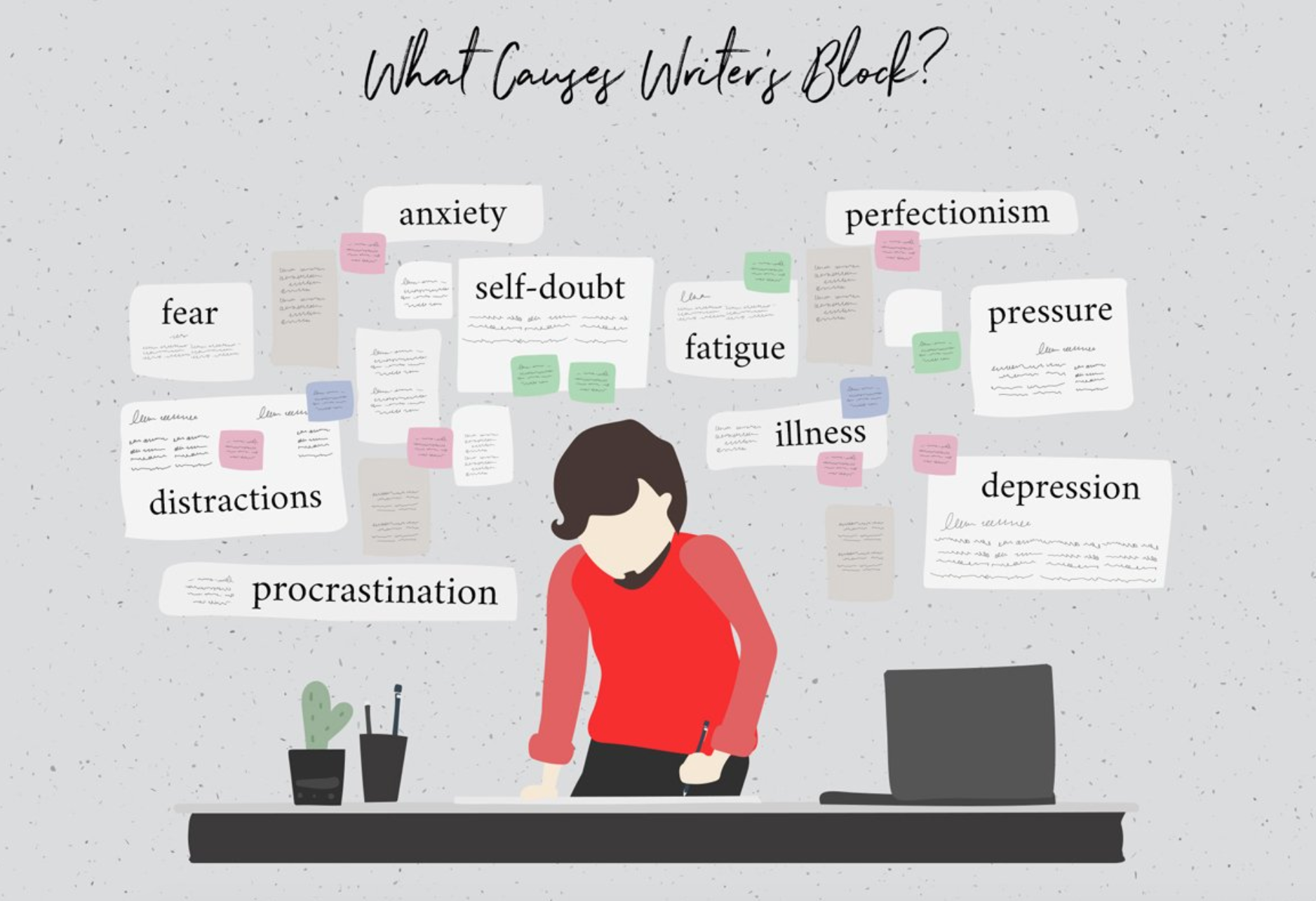
❪ 𝙿𝙸𝙲𝚃𝚄𝚁𝙴 𝙲𝙾𝚄𝚁𝚃𝙴𝚂𝚈 𝙾𝙵 𝚆𝚁𝙸𝚃𝙴𝚁'𝚂 𝚆𝚁𝙸𝚃𝙴. ❫
In the 1970s, Jerome Singer and Michael Barrios, researchers at Yale, studied a group of "blocked" professional writers in a variety of disciplines, from screenwriting to poetry. After several months, they discovered that there are four main triggers of writer's block:
╰─── 𝟬𝟭. Apathy. ╱ ❝ These writers felt constrained by the "rules" of writing and struggled to find their creative spark. ❞
╰─── 𝟬𝟮. Anger. ╱ ❝ These writers were often narcissistic and would get angry if something they created went unnoticed. ❞
╰─── 𝟬𝟯. Anxiety/Self-criticism/Fear. ╱ ❝ These writers worried that they weren't good enough.⠀AND⠀We are our own worst critics. Excessive self-criticism is often what holds writers back from actually writing. Most writers compare their work with that of other, more successful writers or even to their own earlier work. This can often spiral until we can't see our own work in a realistic light anymore and nothing ever seems to be good enough.⠀AND⠀Most writers struggle with fear. Fear of putting themselves and their ideas out there. Fear of others judging them or criticizing their work. Fear of being rejected by publishers or their readers. While fear is completely normal, it becomes a problem once it prevents you from creating anything new. Fear is possibly the biggest reason that some writers don't make it. ❞
╰─── 𝟬𝟰. Conflicts with others/External pressure. ╱ ❝ These writers didn't want their writing to be compared to others' work, resulting in a fear of writing anything at all.⠀AND⠀Those experiencing writer's block sometimes don't want to write, but they are being pressured into writing by others, often parents, followers, friends, or teachers. ❞
Aside from the four main triggers, there are other general causes that can be perceived as more common amongst the younger population. These include, but are not exclusive to, lack of inspiration, lost interest, perfectionism, mental health, personal struggles, fear of wasting time, negative self-talk, impatience, unrealistic or high expectations, procrastination, and work apprehension.
ˏˋ°•*⁀➷ 𝐋𝐈𝐒𝐓 𝐎𝐅 𝐒𝐘𝐌𝐏𝐓𝐎𝐌𝐒 ⸝⸝ ⇗
⠀⠀⠀⠀⠀⠀⠀⠀⠀→ ⺌ This list comes from Writers Write. Credit for this portion goes to them.
*˚‧ Inability to focus.
*˚‧ Drawing a blank.
*˚‧ Feeling no emotional connection to your work/stories.
*˚‧ Brain fog.
*˚‧ Lack of inspiration.
*˚‧ Waned passion.
*˚‧ Feeling burned out or drained.
*˚‧ Work apprehension.
ˏˋ°•*⁀➷ 𝟔 𝐊𝐈𝐍𝐃𝐒 𝐎𝐅 𝐖𝐑𝐈𝐓𝐄𝐑𝐒' 𝐁𝐋𝐎𝐂𝐊 𝐀𝐍𝐃 𝐓𝐇𝐄𝐈𝐑 𝐒𝐎𝐋𝐔𝐓𝐈𝐎𝐍𝐒 ⸝⸝ ⇗
⠀⠀⠀⠀⠀⠀⠀⠀⠀→ ⺌ This section comes from Yuqo and Writer's Write. Credit for this portion goes to them. Disclaimer: I have added my own words, advice, and paraphrased sections of the article.
When it comes to writer's block, what some people fail to realize is that this term is actually an umbrella term for multiple different problems and types of writer's block. (An umbrella term is a "term used to cover a broad category of things rather than a single specific item.") Nor do people realize that what is helpful in one case might be detrimental in another. So, in this section, we're going to be discussing the different kinds/types of writer's block, and some of their solutions.
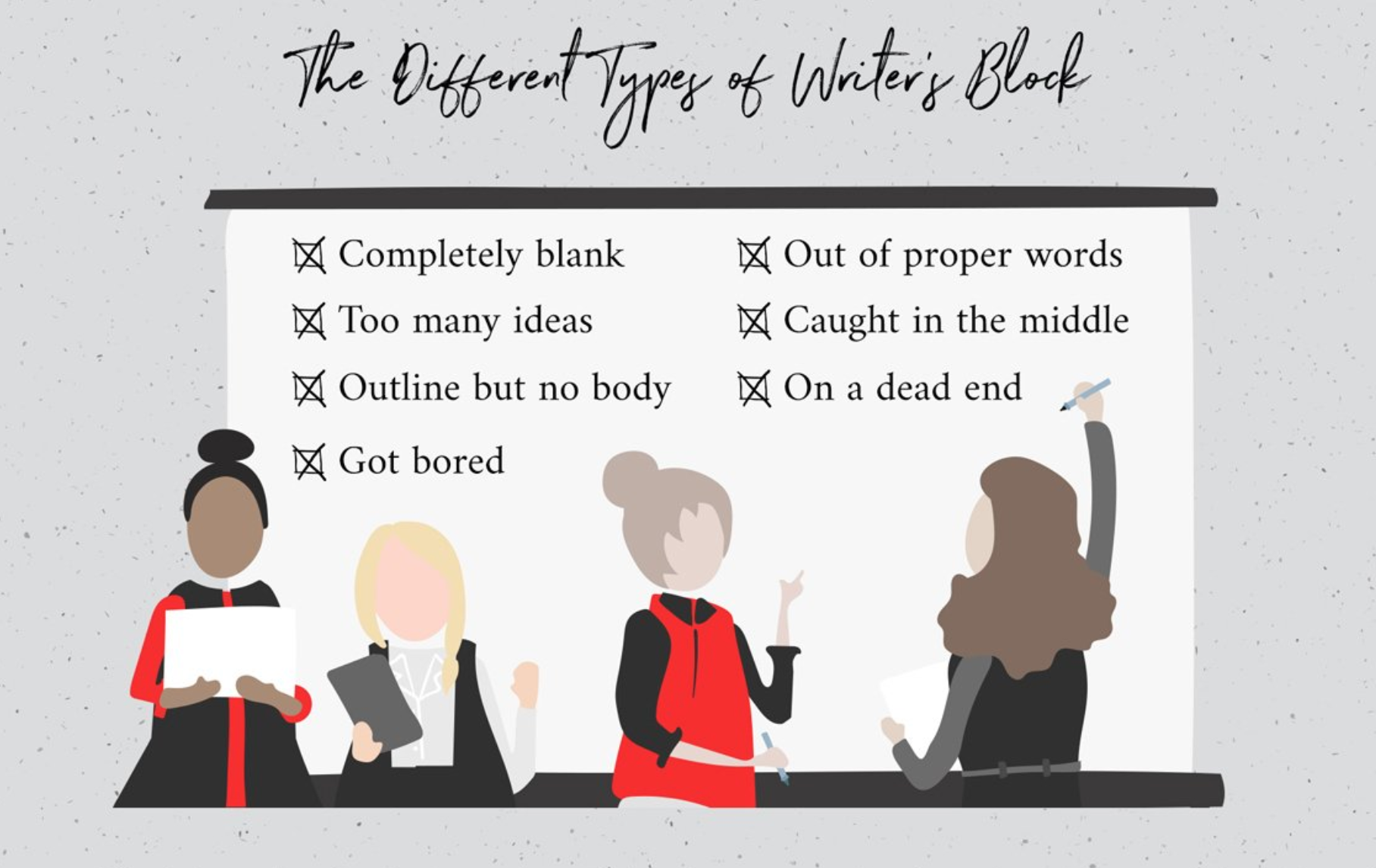
❪ 𝙿𝙸𝙲𝚃𝚄𝚁𝙴 𝙲𝙾𝚄𝚁𝚃𝙴𝚂𝚈 𝙾𝙵 𝚆𝚁𝙸𝚃𝙴𝚁'𝚂 𝚆𝚁𝙸𝚃𝙴. ❫
As with many afflictions of the mind, writer's block can be caused by different factors (as I've mentioned before), and take many forms. In addition, different types of writer's block require different remedies. Here are a few that have been found to be especially common:
╰─── 𝟬𝟭. Fear of exposure. "Many writers freeze when they imagine a future audience reading over emotionally raw or intellectually daring pieces. It's often useful to imagine your target audience while writing, but if that audience becomes too critical or judgmental, it can kill the writing process."
➳❥ SOLUTION: "If you're having this problem, promise yourself that you won't share what you've written until you've combed over it carefully. Write for yourself, with the knowledge that most of what you produce won't go public. The trick is to separate the creative, generative self from the anxious, self-conscious self.
"Another idea is to follow John Steinbeck's strategy of writing to one person. Pick one person to whom your work is most directed (it will often be obvious who) and picture them in your head while you write. Write for them, not the multitudes, and you may find that your fear dissipates."
╰─── 𝟬𝟮. Perfectionism. "For many writers, this is the killer: who among us hasn't been so afraid of writing something terrible that our page remains blank? When the piece exists only in our heads, it maintains a level of perfection that the actual written work will inevitably fall short of."
➳❥ SOLUTION: "Give yourself permission to write something terrible. It's only by writing a mountain of bad and mediocre work that you'll ever uncover the gems. Maya Angelou once said, "What I try to do is write. I may write for two weeks 'the cat sat on the mat, that is that, not a rat.' And it might be just the most boring and awful stuff. But I try. When I'm writing, I write. And then it's as if the muse is convinced that I'm serious and says, 'Okay. Okay. I'll come'".
"Another tool for dealing with perfectionism is to separate the creator and the critic. If the critic in your head is going, "don't write that, this is dumb", you won't get anything done. Instead, promise your inner critic that it'll get the chance to speak when the time is right, and ask it to remain silent while the creator has its turn. Both parts of your mind will thank you."
╰─── 𝟬𝟯. Problems with work. "Writer's block is often portrayed as existing exclusively due to the above causes. However, the reality is more complex. Some writers get blocked because they've become tangled or lost in their work. If the novel has a plot hole that's forcing the writer into a corner, or if the writer finds themselves deathly bored every time they sit down to work, it could be that the subject matter has veered away from what's really important."
➳❥ SOLUTION: "In this case, the medicine might be to stop writing and look at the bigger picture. The writer should think back to when the work was really flowing: what was working then and not now? And how can they shift course to get things back on track? Fiction writers may turn to plotting and storyboarding tools.
"Another way to deal with this problem is through Neil Gaiman's "hibernation" strategy. This is where the writer puts the work away for a few days or even weeks and comes back to it with a fresh mind. Another angle is to ask a friend or family member to help you workshop the piece and give a second opinion.
"A completely different approach is to follow advice from Ernest Hemingway. Hemingway suggests ending the writing day when things are flowing and going well, rather than when they've dried up. This means that you'll start the following day full of fresh inspiration and that your subconscious will work on the story while you're doing other things."
╰─── 𝟬𝟰. No ideas. "What of the writer with nothing to write about? Maybe it's not the process of coming up with words that are holding you back, but the problem of coming up with subject matter. What's a writer with talent but no topic to do?"
➳❥ SOLUTION: "Consider giving your mind some fertilizer. Go on a trip, read the kinds of books you wouldn't normally read, or talk to a stranger. When you live outside your comfort zone, your creativity thrives.
"What if you've tried the above, and still have no ideas? This is where freewriting can come in handy. Take a notebook and write in longhand, without stopping, for three pages. You can write about anything, however nonsensical, but don't stop 'til you've filled three pages. Do this day after day, and eventually, you'll have some good ideas."
╰─── 𝟬𝟱. Can't get in the zone. "You sit at your desk, pound out a few words, and soon find yourself staring at the dreaded flashing cursor. You want to write, but you feel further away from flow and spontaneity than you ever have before."
➳❥ SOLUTION: "Sometimes, forcing yourself to write can feel like fingernails on a chalkboard. In these situations, the best option might be to get your body moving and expose yourself to new stimuli: go for a walk, hit the gym, jump in a pool. Cardio is great for brain cell growth, and when your body gets flowing, your ideas might as well.
"You may also consider following Toni Morrison's advice: she'd set up rituals that she'd carry out as she started writing, like playing her favorite CD or making a certain type of tea. She was essentially conditioning herself to go into writing mode when those stimuli were introduced, prompting the flow states that produced her greatest works."
╰─── 𝟬𝟲. Getting distracted. "For many writers, this is the big one: they're writing, things are going well, and suddenly they're checking their Facebook. Many might not consider getting distracted a form of writer's block, but if it's blocking you from writing, that's what it is."
➳❥ SOLUTION: "There's the old classic: turn off the wifi and put your phone on airplane mode. If you really are chronically distractible, this may be your best and only solution.
"If you have the willpower, you can train yourself to work without distraction. Steve Pavlina, a self-help author, has designed of getting large amounts of work done in 90 minutes; if that kind of hard and fast approach works for your writing style, have at it. It resembles Anthony Trollope's method of training himself to write 250 words per 10 minutes, to which he attributes his ability to write prolifically.
"Writer's block is challenging and often infuriating, but it's possible to overcome. The trick is to correctly diagnose the kind of writer's block you have, and to seek out the correct and appropriate solution."
ˏˋ°•*⁀➷ 𝐅𝐀𝐌𝐎𝐔𝐒 𝐖𝐑𝐈𝐓𝐄𝐑𝐒 𝐖𝐇𝐎 𝐒𝐔𝐅𝐅𝐄𝐑𝐄𝐃 𝐖𝐑𝐓𝐄𝐑𝐒' 𝐁𝐋𝐎𝐂𝐊 𝐀𝐍𝐃 𝐓𝐇𝐄𝐈𝐑 𝐖𝐎𝐑𝐃𝐒 𝐎𝐍 𝐓𝐇𝐄 𝐌𝐀𝐓𝐓𝐄𝐑 ⸝⸝ ⇗
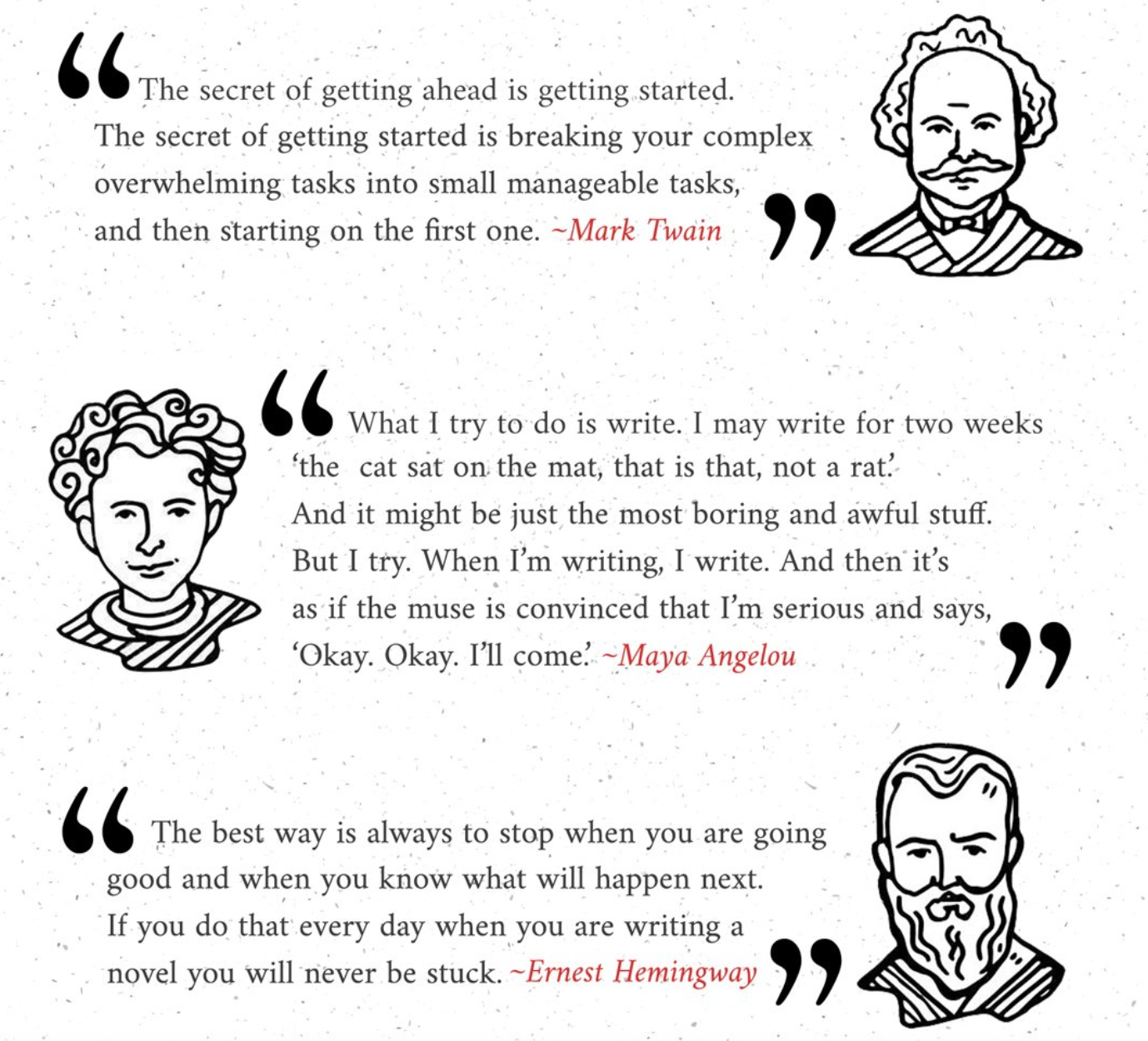
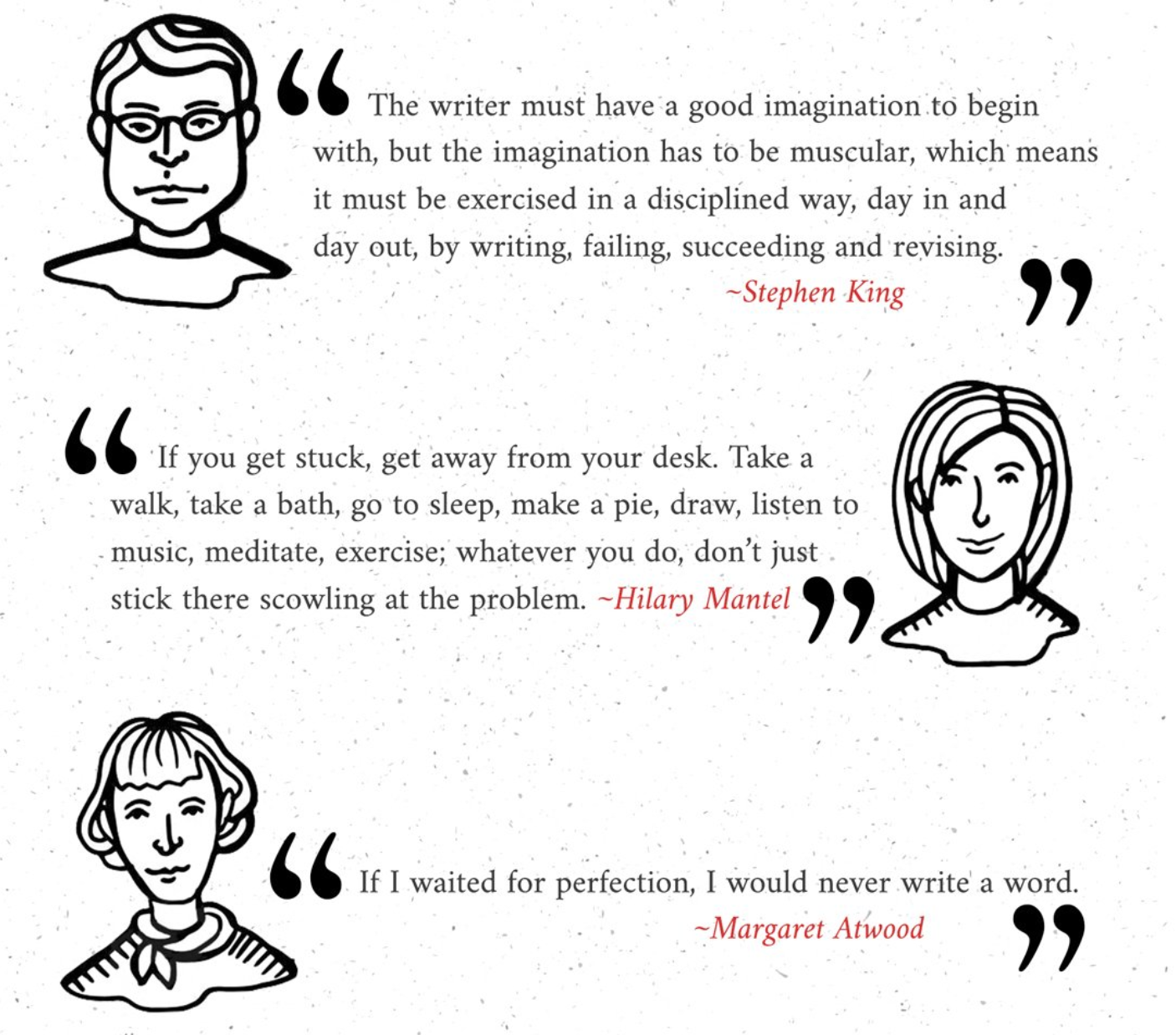
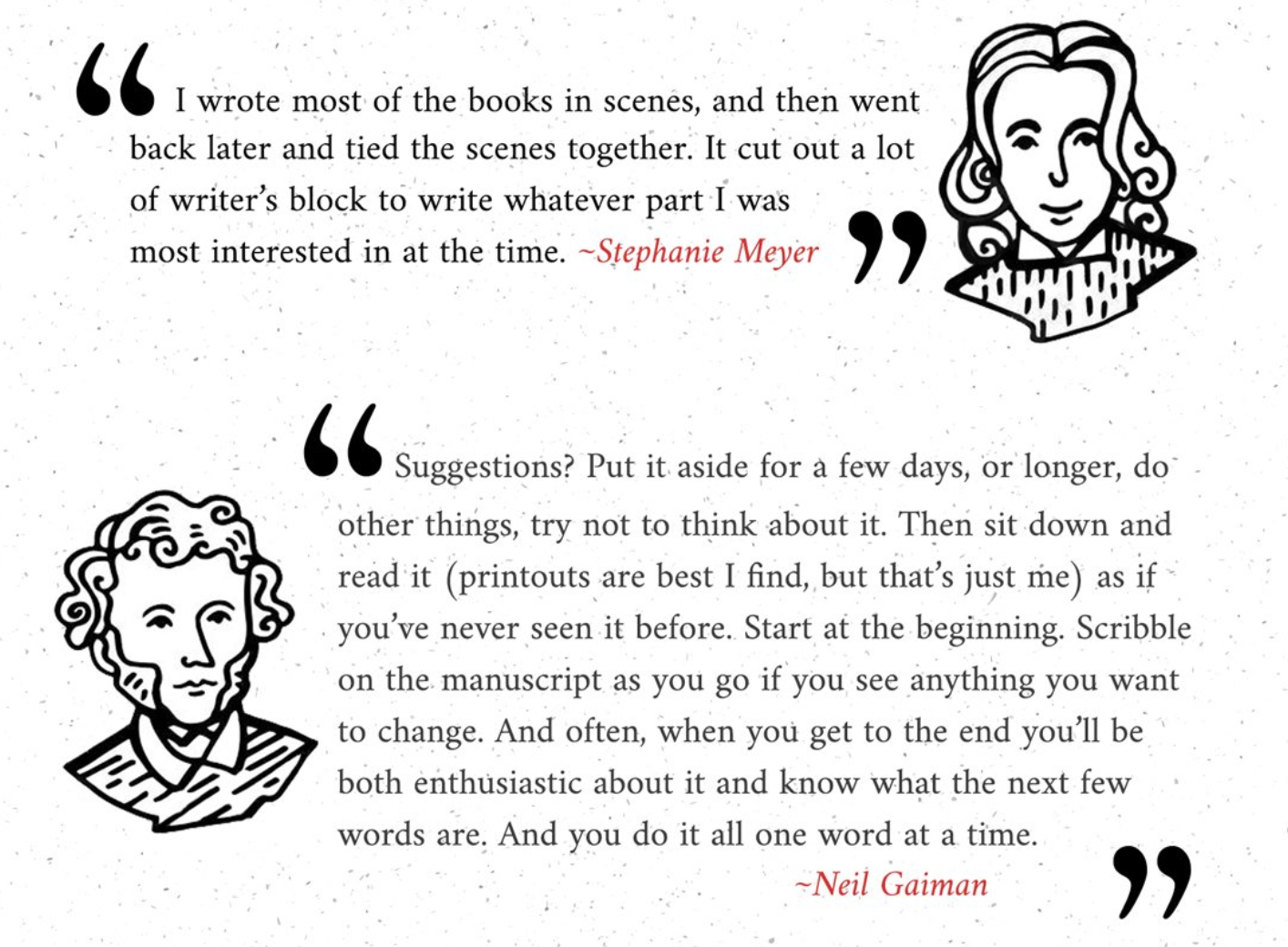
❪ 𝙿𝙸𝙲𝚃𝚄𝚁𝙴𝚂 𝙲𝙾𝚄𝚁𝚃𝙴𝚂𝚈 𝙾𝙵 𝚆𝚁𝙸𝚃𝙴𝚁'𝚂 𝚆𝚁𝙸𝚃𝙴. ❫
ˏˋ°•*⁀➷ 𝐖𝐑𝐈𝐓𝐈𝐍𝐆 𝐄𝐗𝐄𝐑𝐂𝐈𝐒𝐄𝐒 𝐓𝐎 𝐇𝐄𝐋𝐏 𝐋𝐎𝐎𝐒𝐄𝐍 𝐖𝐑𝐈𝐓𝐄𝐑𝐒' 𝐁𝐋𝐎𝐂𝐊 ⸝⸝ ⇗
⠀⠀⠀⠀⠀⠀⠀⠀⠀→ ⺌ This section comes from Master Class and s0urdrop on Tumblr. Credit for this portion goes to them. Disclaimer: I have added my own words, advice, and paraphrased sections of the article.
Although having writer's block can feel as if you can't write at all, there are in fact writing exercises that can help you overcome this invisible barrier. However, keep in mind that these do not work for everybody and can benefit people in different ways.
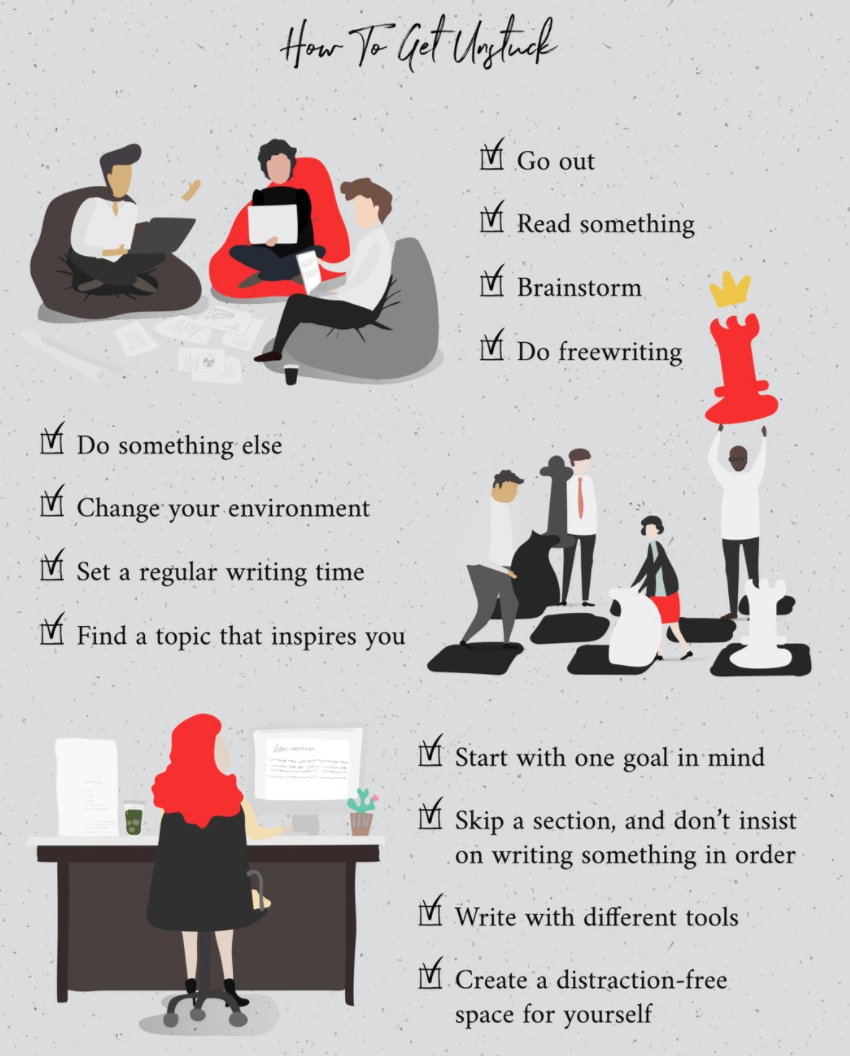
❪ 𝙿𝙸𝙲𝚃𝚄𝚁𝙴𝚂 𝙲𝙾𝚄𝚁𝚃𝙴𝚂𝚈 𝙾𝙵 𝚆𝚁𝙸𝚃𝙴𝚁'𝚂 𝚆𝚁𝙸𝚃𝙴. ❫
Aside from the simple ones above, down below there are three writing exercises that can help you slowly back away from that brick wall and step into the world of creativity once again.
╰─── 𝟬𝟭. Pomodoro Technique. "Decide on what you would like to write. This can be a scene, a chapter of your novel, or simply a page of free writing that will help stimulate an idea. Set a timer for 25 minutes and don't stop writing until the timer rings. Finally, take a five-minute break and repeat these three steps, sticking carefully to the clock."
╰─── 𝟬𝟮. The 30-Minute Challenge. "Set a timer for 30 minutes and write down the events of your day. When you run out of time, note what distracted you (thoughts, noises, interruptions). Research ways that you can selectively remove those distractions from your writing routine. For example, does your computer distract you while you write? You can try going completely analog and using a pencil and pad. Try the same 30-minute challenge a day later, using techniques you researched to remove the distractions you discovered the day before. Repeat the process until you've found your ideal writing space."
╰─── 𝟬𝟯. The pretend-you're-talking-to-a-friend Technique. "Sometimes, writers are too caught up in the rules and structure of writing, be it an article, a novel, or a piece of nonfiction. One way to overcome this is to pretend you're speaking to a friend at a bar and you need to relate to them the story or scene you're working on. How would you describe it to them? If pretending isn't going to cut it, go as far as composing an email or text message to a friend. If any of it seems useful, incorporate the text into your draft."
I hope these were all helpful and if you have any questions or want more tips on this topic, let me know!
▃▃▃▃▃▃▃▃▃▃▃▃▃▃▃▃▃▃▃
❛ YOU 𝑪𝑨𝑵'𝑻 𝑩𝑹𝑰𝑩𝑬 THE DOOR
ON 𝒀𝑶𝑼𝑹 𝑾𝑨𝒀 TO THE 𝚂𝙺𝚈. ❜
○○○○○○○○●

Bạn đang đọc truyện trên: AzTruyen.Top